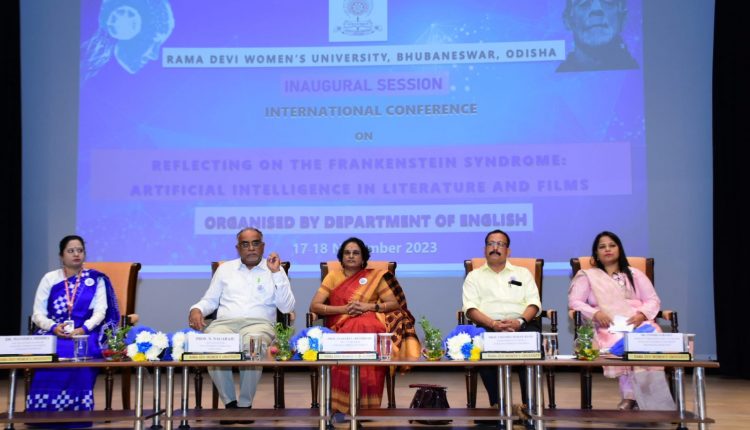International Conference At Rama Devi Women’s University: AI Can’t Replace Human Intelligence, Say Experts
Bhubaneswar: There are debates all over the world about merits and demerits of artificial intelligence (AI).
According to Rama Devi Women’s University Vice-Chancellor Prof. Aparajita Chowdhury, AI should enhance human capabilities rather than replace them.
“The relationship between human intelligence and artificial intelligence is dynamic and hence a relevant concern for discussion and research,” she pointed out at the international conference on ‘Reflecting on the Frankenstein Syndrome: Artificial Intelligence in Literature and Films’.
The two-day conference was organised by the university’s English department at its new auditorium on November 17 and 18.
Prof. Sura P Rath from University of Dallas, Texas, opined that AI can never replace human intelligence because human imagination, emotions, feelings are unique.
“A matter/text generated by AI is like the idol of Sri Jagannath without the ‘daru brahma’ — that forms the soul of the idol. AI can never have the genuine feel of a human writer,” he said while delivering a talk on ‘Mona Lisa’s Smile: The Art of Literary Creation and the Science of AI’.
“How we use technology and advancement of AI to our advantage depends on us. We can make the best use of it if we are cautious and aware of its ethical concerns,” said US-based AI professional Tapan Padhi during a session of ‘The Human Machine: Robots and Cobots in Literature’.
California-based engineer and writer SB Divya, whose book ‘Machinehood’ was nominated for Hugo Award, spoke about the war of dominance between AI and humans, and reflected on AI mirroring humanity and the ethical dimensions of coexistence in her talk on ‘AI: Science Fiction versus Reality’.
Gangadhar Meher University, Sambalpur, Vice-Chancellor Prof. N Nagaraju, who was the chief guest in the inaugural session, dwelled on the impact of AI on unemployment, deepfake controversies and its potential to develop consciousness surpassing human capabilities.
Six technical sessions and 6 plenary sessions were held during the conference. Research papers by academics, scholars and writers cutting across disciplines from reputed national and international institutions were presented.


Comments are closed.